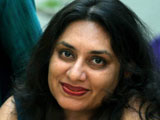On the Front Lines of Comedy
Pakistani comedians push the limitations on free speech

A still from 'Alu Anday,' Beygairat Brigade's satirical music video. Photo: youtube user TheMedia180.
In Pakistan, a country with plenty of bizarre political and social sources of material, to be a comedian is to tread a fine line between the natural freedom of the profession and the fear of censorship.

- Pakistan is a country of contradictions – full of promise for growth, modernity and progress, yet shrouded by political, social and cultural issues that undermine its quest for identity and integrity. My bi-monthly column “Pakistan Unveiled” presents stories that showcase the Pakistani struggle for freedom of expression, an end to censorship, and a more open and balanced society.

- Bina Shah is a Karachi-based journalist and fiction writer and has taught writing at the university level. She is the author of four novels and two collections of short stories. She is a columnist for two major English-language newspapers in Pakistan, The Dawn and The Express Tribune, and she has contributed to international newspapers including The Independent, The Guardian, and The International Herald Tribune. She is an alumnus of the International Writers Workshop (IWP 2011).
Recently, at a session on political comedy at the 2012 Karachi Literature Festival, Ali Aftab Saeed and Saad Haroon, two well-known Pakistani comedians, discussed satire and freedom of speech. “Humor comes from the many contradictions in our society. Social and political satire is very rich in Pakistan because of this,” said Saeed, also a member of the Lahore rock group Beyghairat Brigade. The group became famous for a satirical song called “Alu Anday” (Potatoes and Eggs) which criticized censorship and the culture’s celebration of violence and also poked fun at the nation’s politicians and army chiefs.
The catalysts for writing the song were the death of Salmaan Taseer, the Punjab governor who was killed by an Islamic extremist for demanding changes to the blasphemy law, and the subsequent lionizing of his murderer. But despite the song’s popularity, Saeed recalls receiving “friendly advice” from well-known media anchors to not cross the line with the satire. “We are not safe yet,” Saeed said. “Nothing happened after ‘Alu Anday’ but we’ve got another song coming up. After Taseer-sahib was killed, everyone was silenced for a while, but then a whole new level of discussion was triggered. It’s the job of artists to create this kind of space so that the sacred cows don’t stay that sacred, so that we can talk about everything, question everything.”
Saad Haroon, known for his satirical television program The Real News, had this to say: “Doing my act in English, I can get away with a lot more because nobody cares. Stage performances are in a bubble, but on TV there is so much you can’t talk about. Satire is still very limited on television.”
Haroon’s own popular music video “Burqa Woman,” a good-natured parody of “Pretty Woman” that serenades a woman in a full veil, got him into trouble a few years ago. “Some people were very extreme and threatening, while some had very basic criticisms. The idea of satire is to question. If they looked inside themselves and said, ‘This was very personal to me, and I’m not okay with it,’ that’s good.”
But in Pakistan, what comedians fear most are reactions from the ISI (Pakistan’s intelligence agency), military generals, and Jihadis. Recently, Peshawar-based comedian Nisar Khan wrote and performed a song that made fun of Taliban insurgents who seized thieves, shaved their heads, and mounted them on donkeys. He was kidnapped by militants in mid-April while performing at a wedding. The militants told the audience that they “needed an entertainer urgently.” There is no word yet about his safety. Khan was also kidnapped by extremists last year but was released after a week.
“As satirists, is it more important to do comedy or say something?” asks Haroon. “How far can you push the line before you get shut down? Which is more important? But we do get scared. At one of my shows in Islamabad (Pakistan’s capital and the seat of military and intelligence headquarters), this retired army general was in the audience, and I made fun of him, and he got really mad. I was looking over my shoulder for two months after that. We have this fear that the army is all-powerful.”
To say that the generals and the extremists lack a sense of humor is a moot point in Pakistan. Yet Pakistan’s comedians seem unable to stop pushing the limits of what can and can’t be said in the name of comedy. “We get entertained when we see people getting uncomfortable,” says Haroon. “Our job is to get people to that point.” And they’ll continue to do so even if the repercussions for judging what’s funny and what’s sacred mean far more than just a bad night on stage for the Pakistanis on the front lines of comedy.





One Comment on "On the Front Lines of Comedy"
Very true. Real depiction of Pakistan scenario and much needed thing in Pakistan.